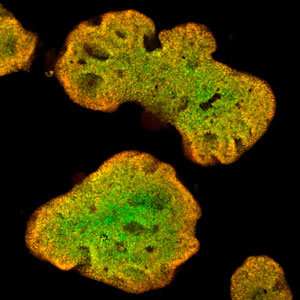Growing pancreatic stem cells for research on diabetes

A new cell culture procedure developed by A*STAR will assist the study of diabetes and facilitate better treatments. "Our discovery will enable studies of how the pancreas forms and why certain cells malfunction in diabetes," says Jamie Trott of the A*STAR team.
Type 1 diabetes occurs when insufficient insulin is released into the bloodstream by the beta cells of the pancreas. Insulin promotes the uptake of glucose from the blood by the body's cells. Diabetes therefore causes high blood glucose levels, which can be fatal if not controlled. The levels are controlled by administering insulin, but if too much is given, there is a risk of low blood glucose. These and other risks of diabetes can lead to long-term complications, including problems with vision and the circulatory system.
Researchers use cultured cells to explore what goes wrong in beta cells and to develop new ways to control or correct the problems. It has proved difficult and time-consuming, however, to generate suitable cell lines. Pluripotent stem cells—those able to develop into a wide range of mature cell types—can be guided through stages that mimic embryonic development, leading to the formation of beta cells. Unfortunately, this procedure yields considerable variability in the cells, which can make it difficult to interpret the results of different studies. It also involves many time-consuming steps.
Researchers at the A*STAR Institute of Medical Biology and the Genome Institute of Singapore have developed a new method that reduces the number of steps and ensures a more consistent supply of beta cells, by generating pancreatic stem cells and expanding them.
"We found a way to propagate pancreatic stem cells, which are developmentally much closer to the beta cells we need," says Trott (see image). The researchers explored modifications to the cell culture conditions in which these stem cells developed, eventually discovering a cocktail of signals that enabled the cells to grow.
"Seemingly minor differences in culture conditions turned out to be the difference between success and failure," says Trott. "It took a while to identify the importance of these variables and to control their effects."
A key feature of the new procedure is that the pancreatic stem cells are self-renewing, so they can be expanded repeatedly to generate an enormous supply of beta-like cells, without the frequent need to go through the many stages of embryonic development. This should make it easier, faster and cheaper to produce supplies of beta cells for scientists investigating diabetes.
The researchers plan to improve their technique and investigate the molecular factors controlling the cells' development.
More information: Jamie Trott et al. Long-Term Culture of Self-renewing Pancreatic Progenitors Derived from Human Pluripotent Stem Cells, Stem Cell Reports (2017). DOI: 10.1016/j.stemcr.2017.05.019


















